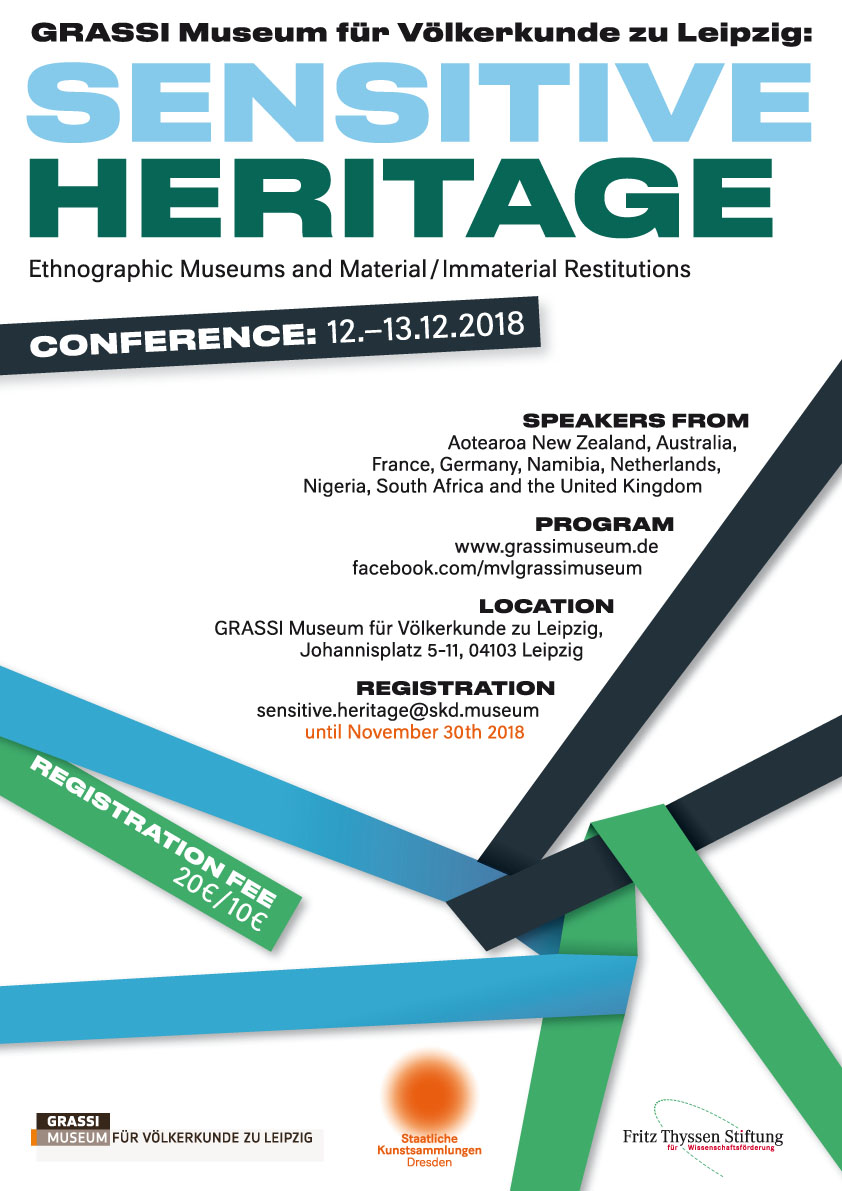Sensitive Heritage: Ethnographic Museums and Material/Immaterial Restitutions offers a platform to present international expertise to the State Ethnographic Collections of Saxony and the German ethnographic museum landscape with the dual goal of developing these insights towards their reapplication in other institutional settings, and of establishing restitution as ethnographic method. Thematically, the conference focusses on current restitution claims of human remains from Australia, Aotearoa New Zealand and Namibia, as well as sacred/secret objects and other sensitive collections. One thematic emphasis will be placed on material restitution and the preceding provenance research, which can lead to the rehumanising of human remains (and their reduced status as scientific specimen) as well as the re-sacralisation of so-called ethnographic objects through culturally respectful treatment and appropriate notions of care. The second thematic emphasis will be on immaterial restitution (virtual, digital) of, for example, photographs and archival documents, which facilitates historical provenance research in collaboration with, and permanent access to, representatives of originating societies. The consideration of the sensitivities of depicted persons (and their descendants) and of the ensuing ethical issues concerning the treatment of, and engagement with, historical photographs shall inform the discussion on the practices and politics of digitisation.
Program
12.12.2018
10:00-10:30 Welcome
Prof. Marion Ackermann (General Director, Dresden State Art Collections – SKD)
Uwe Gaul (Staatssekretär im Sächsischen Staatsministerium für Wissenschaft und Kunst)
Nanette Snoep (Director, State Ethnographic Collections of Saxony – SES)
10:30-12:30 Pacific
Linnae Pohatu (Auckland War Memorial Museum Tamaki Paenga Hira, Aotearoa New Zealand)
Losing control: Museums building partnerships with Maori and Pacific communities
Amber Aranui (Museum of New Zealand Te Papa Tongarewa)
Restitution or a loss to science? Understanding the importance of returning Māori ancestral remains
Phil Gordon (Australian Museum)
The evolving role of repatriation and Aboriginal cultural objectives
Dr. Michael Pickering (National Museum of Australia)
Call me! Museums liaising with Indigenous peoples in the 21st century
Lunch break
13:30-15:30 Africa
Prof. Ciraj Rassool (University of the Western Cape, South Africa)
Restitution, return and the postethnographic
Dr. Jeremy Silvester (Museums Association of Namibia)
The return of the power stones
Esther Utjiua Muinjangue (University of Namibia)
The significance of rituals in the repatriation process of human remains: A Herero perspective
Prof. Peju Layiwola (University of Lagos, Nigeria)
Benin art as contested heritage
Coffee break
16:00-17:30 Europe
Dr. Emmanuel Kasarhérou (Museé du Quai Branly, France)
A case of restitution of human remains from France to New Caledonia: Act of reparation or bone on contention?
Dr. Lissant Bolton (British Museum, UK)
Knowing and not knowing about collections: Perspectives from Vanuatu
Prof. Wayne Modest (Research Centre for Material Culture, Leiden, Netherlands)
Staying with the trouble: Ethnographic museums and the question of repair
13.12.2018
09:30-11:30 Germany
Dr. Felicity Bodenstein (TU Berlin, Germany)
Incomplete returns and desires for restitution: The case of the Benin Bronzes before and after Nigerian independence
Prof. Barbara Plankensteiner (Museum für Völkerkunde Hamburg, Germany)
Challenges in establishing and caretaking of a multilateral relationship: The Benin Dialogue
Dr. Paola Ivanov (Ethnologisches Museum Berlin, Germany)
Sharing the heritage of colonial violence: Towards a collaborative reactivation of the Tanzania collection of the Ethnologisches Museum in Berlin
Dr. Larissa Förster (CARMAH, Berlin, Germany)
Restitution, repatriation, reconciliation – What’s at stake?
Coffee break
12:00-14:00 Germany
Sarah Fründt (Freiburg University, Germany)
Far behind, but catching up?! Debates on repatriation and restitution in German institutions
Gesa Grimme
Where to start? Systemizing provenance research on collections from colonial contexts
Dr. Andreas Winkelmann (Brandenburg Medical School, Germany)
Experience with repatriation of human remains from Germany to Australia, Namibia, and Paraguay
Dr. Claudia Andratschke (State Museum Hanover, Germany)
The project „Provenance Research on Non-European Collections in Lower Saxony“ – a joint attempt to deal with a difficult legacy
Lunch break
15:00-16:30 SES-SKD
Prof. Gilbert Lupfer (SKD, Germany)
Sensitive matters of provenance research at the Dresden State Art Collections
Dr. Birgit Scheps-Bretschneider (SES, Germany)
Our common histories and the importance of immaterial restitution
Dr. Philipp Schorch (SES, Germany)
Restitution as ethnographic method
Registration
Please register until November 30th 2018 via .
When you register, please attach to your e-mail the receipt of your transfer of the registration fee (€ 20 regular / €10 discount) to the following account:
Empfänger: Staatliche Kunstsammlungen Dresden
Bank: Ostsächsische Sparkasse Dresden
IBAN: DE47 8505 0300 3100 3332 40
BIC: OSDD DE 81
Verwendungszweck: „sensitive heritage “
Veranstaltungsort
GRASSI Museum Leipzig
Johannisplatz 5-11
04103 Leipzig

